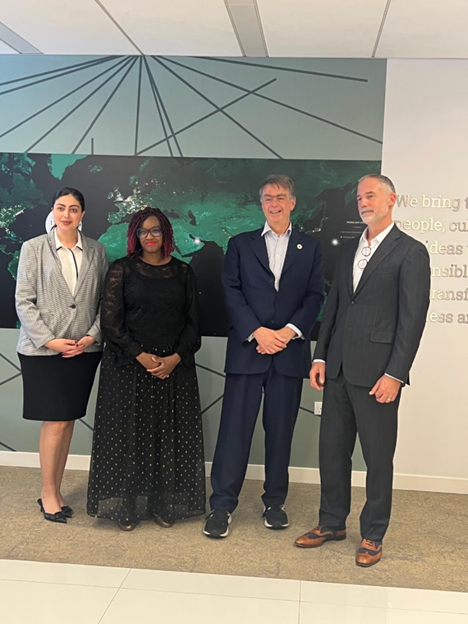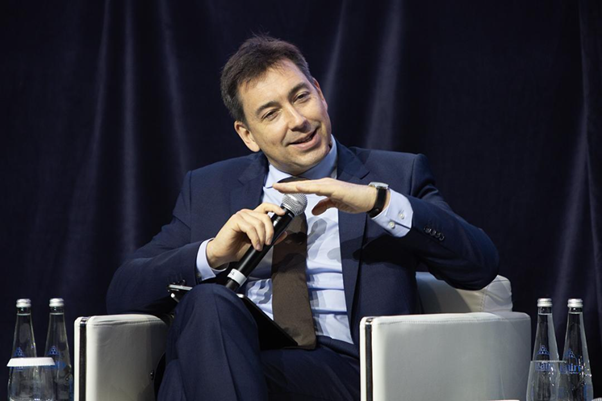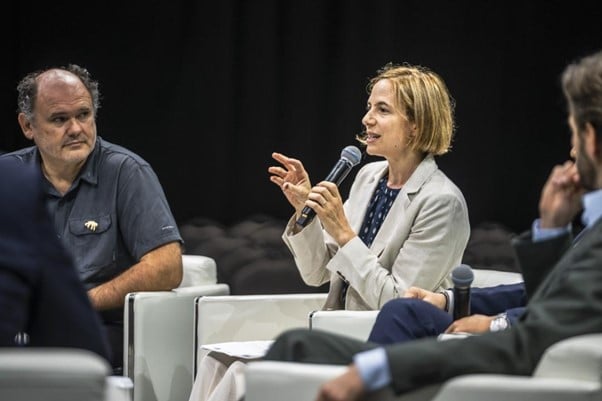
Founded in 1948 in Fontainebleau alongside INSEAD, IUCN has long led global nature conservation efforts. INSEAD’s participation in the IUCN World Conservation Congress – Business Summit is both timely and strategic, reinforcing its role across major sustainability platforms such as COP, the SDG Tent at Davos, the World Economic Forum, ChangeNOW, the UN PRME, and others. As the inaugural partner of the IUCN Business Summit, together with the UN Global Compact and the World Business Council for Sustainable Development, INSEAD continues its academic research in sustainability while staying close to business.
At the same time, the school’s impact extends beyond its research and teaching. True to INSEAD’s mission, its alumni are proudly working toward a more sustainable and inclusive future. We were both proud and humbled to meet some of them at the Congress in Abu Dhabi and learn about their work.
Left to right: Zeina Sleiman, Director Alumni Engagement and Learning, Lite J. Nartey, INSEAD Affiliate professor, André Hoffmann and Mark Mortensen, Associate Dean of the INSEAD Middle East Campus and Professor of Organisation Behaviour.
André Hoffmann MBA’90D, Vice Chairman of Roche Holding AG, co-chair of the World Economic Forum, and Founding Member and Chairman of the Advisory Board of the INSEAD Hoffmann Institute, is no stranger to global platforms like IUCN. For many years he’s been focusing his work on supporting and advocating for nature and nature positive futures, highlighting the role of business. At the IUCN Nature Positive Pavillion - Business Summit he stressed that “business has destroyed the planet because it focused on short-term profit maximisation.”
He further commented to us that “collaboration across sectors is essential if we want to scale solutions that genuinely protect biodiversity. Business success depends on healthy natural ecosystems; protecting and regenerating nature is not philanthropy, it is strategy.”
These statements were echoed by Adonai Herrera-Martinez MBA’09. “Defining nature as infrastructure is genius. Look at the etymology of the word infrastructure - it is the structure that lies below, and nothing lies more fundamentally beneath socio-economic systems than nature. Preserving and restoring nature is therefore essential at both macroeconomic and microeconomic levels, since undermining nature threatens long-term economic sustainability and poses risks to companies.”
Adonai Herrera-Martínez is the Director of Environment and Sustainability at the European Bank for Reconstruction and Development (EBRD). Currently based in London, Adonai worked at UNDP and CERN.
We sat down with Adonai in-between his many speaking engagements: at the Congress he spoke about aligning climate and energy goals, advancing nature policies and renewables for nature.
Photo by IISD/ENB Angeles Estrada
"We are here at the Congress because IUCN is the world’s largest conservation union and the event is therefore an essential forum for sharing EBRD’s work on biodiversity and learning how to enhance financial flows and impact towards nature,” - Adonai explains.
His team implements the Bank’s environmental and social policy, ensuring projects follow do-no-harm principles and deliver positive socio-economic impacts, including a transition to green economies. Beyond safeguards, they focus on accelerating the nature agenda —conservation, restoration, and sustainable management of living natural resources.
Examples of such opportunities extend beyond sustainable tourism to sectors like agribusiness and renewables. "The rationale for investing in nature can be summarised in the following way: at a macro level, nature is an asset; depleting it creates risk; and significant opportunities exist now and will grow in the future to enhance this new asset class.”
He then outlined barriers to investing in nature: lack of information, market failures such as the tragedy of the commons, and the under-valuation of freely provided ecosystem services. Information asymmetry must be bridged, as illustrated by the contrast between investors who recognise nature’s value and many developers who do not. Another barrier is that positive nature externalities remain unpriced, making biodiversity credits or similar incentive mechanisms necessary to reward investors for doing the right thing.
Dr Rebecca Stern, Dunya Analytics CSO. Photo by IISD/ENB Danny Skilton
Investing in Nature: Reinvent, Inform, Transition
Considering the above conversation, we were thrilled to see Dunya Analytics at IUCN. Dunya Analytics is a public benefit corporation on a mission to accelerate the transition to a sustainable and equitable economy, founded by Megan Pillsbury MBA’07J.
Megan explains: “The new green economy means we must reinvent whole industries. To make that possible, every company needs to be empowered with the insights they need to pursue their transition path.”
We sat down with Dr. Rebecca Stern, Chief Scientist at Dunya Analytics, right after her panel on nature tech. “The IUCN World Conservation Congress is often described as the heartbeat of global conservation. This is where many of these datasets have been discussed, debated, and updated for decades. As Chief Scientist, I’m responsible for ensuring our methodology is robust, that our datasets are fully vetted and scientifically rigorous, and that our approach aligns with leading frameworks like the TNFD and the upcoming CSRD regulation. At Dunya Analytics we don’t want the datasets to exist solely for scientific purposes—we want companies to apply them, set priorities, and act as quickly as possible.”
Dr. Stern also reflected on the barriers to integrating nature into business and investing in nature: “One of the biggest challenges is that many companies still don’t think nature risk applies to them. But nature risk affects everyone. Some industries may feel it more directly, but every company depends on natural resources. One of the barriers is simply failing to recognize this. That’s what we’re trying to solve at Dunya Analytics—making it intuitive and easy for any company, in any industry, anywhere in the world, to understand where their biggest risks lie.”
We spoke with our alumni and partners at the IUCN about “what’s next?”—acknowledging both the challenges ahead and the small but meaningful steps already being taken.
Dr. Stern concluded:
“We can't fully reverse climate change or nature loss, but we can make a real difference in what we are able to protect and restore. And that margin matters - the margin by which we improve things matters to all life on Earth. If I can help move that needle even a centimeter, it’s worth it.”
We thank IUCN World Conservation Congress, and INSEAD Alumni for dedicating the time to share these insights with us.
Subscribe to our Hoffmann Institute Quarterly Newsletter
Stay informed on our 60 second quarterly video updates, stories, video recordings of our webinars, and details of upcoming events and much more.



